Ambassador Liu Xiaoming Holds a Press Conference on China's fight against Novel Coronavirus epidemic
2020-02-27 10:34:00 | Source:chinese-embassy.org.uk2020-02-08
On 6 February 2020, H.E. Ambassador Liu Xiaoming held a press conference at the Chinese Embassy on China's fight against Novel Coronavirus epidemics. More than 50 journalists from 27 media agencies attended the press conference, including BBC, ITV, Sky News, Channel 4, 5 News of Channel 5, Reuters, Financial Times, The Daily Telegraph, The Times, Guardian, Evening Standard, Daily Mail, Leading Britain's Conversation of the UK, China's Xinhua News Agency, CCTV, China News Service, CGTN, China Daily, and Bloomberg, AFP, RT, the National of United Arab Emirates, China South Morning Post, Phoenix Infonews, European Times, UK Chinese Times and UK Chinese Journal. Also present at the press conference were envoys and diplomats from the diplomatic missions of the Philippines, Cambodia, Canada, Finland, Spain and ROK to the UK. BBC, Sky News, CGTN and RT broadcast the press conference live.
The following is the transcript of the press conference.
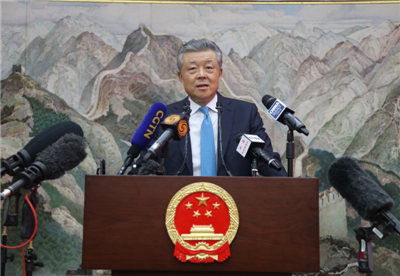
Ambassador: Good morning! Thank you for joining us at the Chinese Embassy for today's press conference about the updates of the novel coronavirus situation and prevention and control measures in China.
Since the outbreak of the disease, the Chinese Government has taken a series of decisive and rigorous prevention and control measures. The speed, intensity and coverage of China's response have been unprecedented in the world. Let me use three "great's" to expound China's actions.
First, the Chinese Government has attached great importance to epidemic prevention and control.
President Xi Jinping has made important instructions on many occasions, emphasising that the safety of life and health of the people are the top priority. He also called twice the meetings of the top leadership and set up a taskforce to map out plans of epidemic prevention.
Premier Li Keqiang, entrusted by President Xi, went to Wuhan to lead the counter-virus efforts. The whole nation has been mobilized; prevention and control efforts have been deployed and strengthened across the country. China has gone all out to fight the disease.
-
At the national level, the relevant government departments are taking up their responsibility; the military has been mobilised to help;
-
In all the places, the counter-virus taskforces are led by key Party and government officials.
-
At the very frontline of treatment and care, medical workers are making selfless sacrifice and showing tremendous courage.
-
In the communities, the people stand united to wage a "people's war" against an invisible enemy.
The vigorous measures are taking effect gradually. On the whole, the epidemic is preventable, controllable and curable.
Second, the Chinese Government has demonstrated a great sense of responsibility.
Since the outbreak, the Chinese Government has taken the most comprehensive and strict prevention and control measures, many of which go far beyond the requirements of the International Health Regulations. By taking these measures, China is safeguarding the safety of life and health of not only the Chinese people, but also people of the whole world. China is doing its best to safeguard global public health.
-
Temporary measures of collective quarantine have been implemented in Wuhan and other places to prevent further spread of the disease.
-
More than 6,000 medical professionals from all over the country have arrived in Hubei Province, including Wuhan.
-
Medical supplies such as masks, hazmat suits and medicines, and daily necessities such as meat and vegetable have been transported to the affected areas without delay.
-
Two specialised hospitals, Huoshenshan Hospital and Leishenshan Hospital, were built in ten days and have started to receive and treat the critically ill.
I want to emphasize that, although a large number of people have been infected with this virus, the mortality rate in China, which stands at 2.1%, is very low. This is much lower than Ebola (40.4%), SARS (10%) and MERS (34.4%). In the United States, more than 19 million people have fallen ill with the flu so far this season, with the death toll being ten thousand. This is more serious than the coronavirus infection. Currently in China, the number of cured patients of is rising. We are fully confident in beating the virus.

China is also honouring its obligation. Dr. Tedros, the Director General of the World Health Organisation, has expressed full recognition of China's prevention and control efforts, and spoken highly of the tremendous contribution that China has made to the world in fighting the disease. He said that China "is setting a new standard for outbreak response."
China attaches great importance to containing the potential spread of the virus to other countries and regions. It has strengthened management and control on overseas travelling of Chinese citizens, and called on the Chinese people to take up their social responsibilities to help prevent further spread of the disease.
As of February 3rd, there were 153 confirmed cases outside China, which accounted for less than 1% of all cases. This is a testament to the effectiveness of the measures that China has taken and its important contribution to preventing the spread of the disease and protecting the health and safety of people of China and the whole world.
Third, the Chinese Government has attached great importance to enhancing international cooperation.
China is open, transparent and responsible in its cooperation with the world.
First, China has shared with WHO, the relevant countries, and the regions of Hong Kong, Macao and Taiwan the information about the epidemic, including the genetic sequence of the virus. This is highly appreciated by WHO and many countries. China has also kept in close touch with many countries at the bilateral level on the prevention and control of the disease.
Second, China has attached great importance to the safety of foreign nationals in China and tried its best to address the difficulties they face by keeping them informed about the epidemic through various channels, including through foreign representative institutions. As of February 2nd, sixteen foreign nationals in China have been tested positive of the disease, of which, two have been cured, and 14 are under quarantine and treatment, and are all in stable conditions. China has also offered assistance to some countries, including the UK, in evacuating their nationals.
Third, China is enhancing cooperation with the international community on the research and development of the vaccine. We are working together to safeguard the safety of public health around the world.
In face of the epidemic, people have shown great love to each other. Government officials and people from all walks of life in many countries have expressed their sympathy, trust and support for China. Many governments and international organisations have donated supplies for epidemic prevention and control.
Here in the UK, in addition to government aid, the business community, the Chinese associations and Chinese students have donated money and supplies through various channels. A few days ago, a donation ceremony was held here at the Chinese Embassy, attended by more than 20 Chinese community and student associations in the UK. We have been deeply touched and greatly encouraged. We would like to express our heartfelt thanks to all those in the UK who have shown their love and kindness!
Ladies and Gentlemen:
The Chinese Government has the firm resolve and has taken vigorous measures to prevent the spread of the disease. This will continue to be the most important work.
First, we will try our best to treat the infected.
Every life counts. The right to survival and health is the most basic and important human right. Medical institutions all over China are doing their very best to increase the hospitalization rate and cure rate, and reduce infection rate and mortality rate.
Second, we will strengthen the epidemic prevention and control efforts in key areas.
By key areas, we mean Hubei Province, especially Wuhan City. Prevention and control measures are being improved and strengthened in this Province.
-
Patients are diagnosed, reported, isolated and treated at a most timely manner.
-
Monitoring of the epidemic development is strengthened.
-
The infected are treated in specialised hospitals.
-
People who have had close contact with patients are under close medical observation.
All these are aimed at preventing further spread of the disease.
Third, we are enhancing international cooperation on epidemic prevention and control, and on scientific research.
China will continue working closely with the WHO and the relevant countries and regions.
A few days ago, China published multi-language versions of the Guide for General Public to Prevent Pneumonia Caused by the Novel Coronavirus, which has been shared with all countries in the world through social media and other channels at top speed. This demonstrates China's sincerity to work with the international community to fight the disease. This also shows China's determination to take up its responsibilities as a reliable global player.
As I understand, researchers from China, the UK and other countries are working round the clock to trace the origin and transmission route of the virus, follow closely its evolution, share the relevant data and case information, design prevention and control strategies and measures, and develop new drugs and vaccine.

Ladies and Gentlemen:
It is understandable that there are concerns in the UK and the rest of the world about the epidemic. Some people are worried that it might have a negative effect on China's economy or even the world economy. There are also overreactions by individual countries, panic among the public, and even insulting and discriminatory remarks and behavior targeting the overseas Chinese community. With regard to these issues, I want to stress the following four points:
First, the impact on China's economy should be seen from a comprehensive perspective.
At the moment, the epidemic is having a relatively severe impact on the service sector, including transport, tourism, hospitality, catering, films and entertainment.
But the impact will be short-term and temporary. It will not change the fundamentals of China's economy, which will maintain sound growth in the long run.
China's economy is highly resilient and has enormous potential for growth in the mid-to-long term. China has the capability and confidence to minimise the economic impact of the epidemic.
The World Bank, the IMF and well-respected economists in the world have all agreed that the impact of the epidemic on China's economy is temporary, and they have full confidence in the future of China's economy.
Second, understanding of the epidemic should be objective and reasonable.
The WHO has reiterated that it disapproves of and is even against travel and trade restrictions on China. In recent days, the UK, at the bilateral level, has fully recognised China's tremendous efforts and effective measures in fighting the virus. It also expressed the willingness to enhance cooperation with China and do its best to assist China in these efforts.
It is our hope that governments of all countries, including the UK, will understand and support China's efforts, respect the professional advice of the WHO, avoid overreaction, avoid creating panic, and ensure the normal cooperation and exchanges between countries.
Third, media reports of the epidemic should be objective and fair.
Coronavirus has been hitting headlines in many countries, including the UK. Many of the reports speak highly of China's counter-virus efforts or offer objective and reasonable advice. We appreciate that. However, some reports are biased, or even contain malicious slander and disinformation.
Rumours and panic are more frightening than the virus itself. Confidence and determination are of vital importance in overcoming the epidemic. The issue of public health goes beyond national borders and requires the joint efforts of all sides, including the media, who should take up their due social responsibility in this battle against a common enemy of all mankind.
Fourth, we should join hands to oppose any insulting or discriminatory words and behavior.
I fully agree with Dr. Tedros, the Director General of WHO, who said, "This is the time for facts, not fear. This is the time for science, not rumours. This is the time for solidarity, not stigma."
I believe this is a time for reason and cool-headedness. This is a time for scientific approach and rational response. It is my hope that people from all quarters of the society will stand up against this challenge and pull together.
Ladies and Gentlemen:
A Chinese saying goes, "When people are of one mind, they can move Mount Tai."
I am confident that under the strong leadership of the Communist Party of China, and with the strengths of socialism with Chinese characteristics, the solidarity and perseverance of the Chinese people, and the broad support from the international community, we will beat the virus!
Every time I host a press conference, I would play a video clip. Today, I want to share a heartwarming clip showing how our British friends are standing with us to meet the challenges.
(Video is played.)
Now I would like to take your questions.

CGTN: First of all, Ambassador, there seems to be a race at the moment to try and find a vaccine. And you mentioned cooperation with the British. Some say they are close to finding a vaccine. Can you just elaborate on that? How closely are you working on this?
Secondly, there are reports you are unhappy about Boris Johnson's personal lack of leadership towards China on this. Is it true that you are unhappy that he hasn't sent a personal message showing support for China?
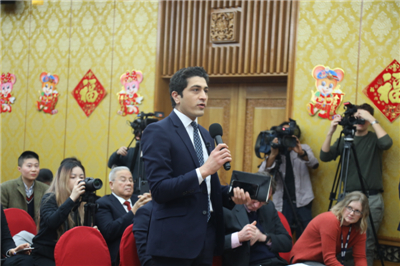
Ambassador: Since we have so many journalists today, I would say, we take one question from one journalist first. Then if we have time, we can have a second round. Since I didn't notify you in the first place, so I can answer your two questions. But for others, I hope you will stay with one question.
Yes, we have collaborations with British scientists. There are already some joint labs between China and the UK, even before the outbreak of the disease, on prevention of epidemic, between Chinese institutions and universities here, like Oxford University and Imperial College. And now they started working around the clock. Now they have a target to work on: the vaccine and medicine to fight this coronavirus. So we hope that it won't be long before they will make substantial success in their joint efforts. And the government is very supportive of their efforts, and my Embassy tried our very best to facilitate the communication and the exchanges between the scientists of our two countries.
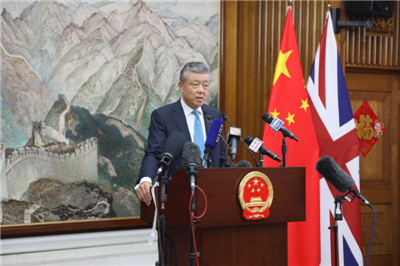
With regard to whether I'm satisfied or not satisfied with the British government response, I would say, we are pleased and thankful to the British government. Since the outbreak, our two governments maintained very close contact. Cabinet Secretary Sedwill and Secretary Raab had telephone conversations with their counterparts, Director Yang Jiechi, and State Councilor and Foreign Minister Wang Yi. The British side spoke highly of the prevention and control measures taken by China, and also offered to help, and we appreciate that. There's no such an issue with regard to disappointment, displeasure or discontent about British government's response.
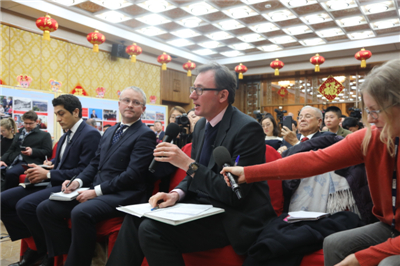
BBC: I have two questions, too, but I'll put my hand up later at the press conference. Maybe I'll get lucky for a second round. You spoke just now about your frustration and what you call the overreaction and panic that had been generated by some foreign governments including the UK. Can you be more specific? What was it that you felt was an overreaction? Are you referring to the British government's warning to British nationals in China, saying "if you can, leave".
Ambassador: As I said, the channel of communication between China and the UK on the government level is very open, not only on the top level, but also on the working level. I have a very good communication with my counterparts in the Foreign Office, including Acting Permanent Under-Secretary and Director-Generals. And my deputy and counselors also maintained almost daily contact with their counterparts. In our conversations, we express our position that the measures taken by China are effective. There should be no panic, and there should be no overreaction. We advise the British side to take the professional advice of WHO. And British side also agreed with us. Of course they spoke highly of our efforts, and recognized the effectiveness of the measures taken by China. They also told us they would follow WHO advice.
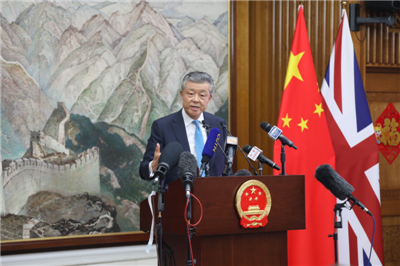
It seemed to me that the words do not match with the deeds. I noticed, probably you also notice, that WHO Director-General has spoken publicly about his reservation, or maybe his criticism, of British government's latest advice to ask all British nationals to leave China. He does not think this is helpful. He does not think this, what he described as, "blanket approach" towards the epidemic in China is helpful. Because there's quarantine in a city, but not the whole of China. Life is still normal in most part of China. And so I do say again, in private and in public, that I hope the British government and the British public should take objective, cool-headed view of what is going on in China. And I do hope that they should regard it first as a threat to the whole world. So that calls for the international effort. We should support each other, rather than to weaken the others' efforts. So that is my advice.
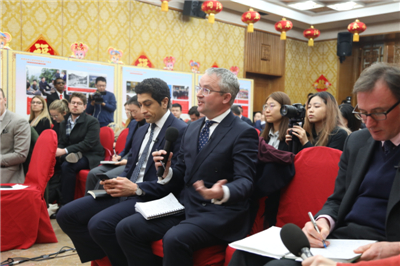
5 News: Mr. Ambassador, you say you're very pleased with the British cooperation and there is close contact, and yet you accused overreacting.
Ambassador: I'm not accusing. I would like to see their words will meet their actions.
5 News: Given that close contact you spoke about, how surprised were you when that advice was given to British nationals in China?
Ambassador: We don't think there should be such a panic. We've been given notice before they made a formal announcement. So that's why we keep close contact. And we advise them. We don't think it is a good idea. We believe that the epidemic is controllable, preventable and curable. And so we asked British side to take objective, cool-headed approach, and also to ensure the normal exchanges and cooperation between the two sides. That should not be interrupted.
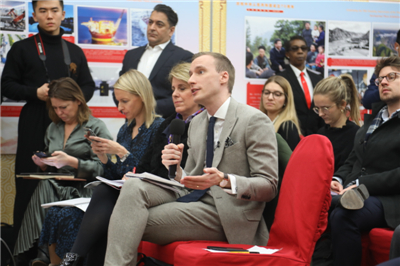
ITV News: Are you concerned that, if there are further cases confirmed in the UK, it will discredit everything you just said about China's ability to contain this virus?
Ambassador: I cannot rule out new cases, because this is really something we do not know well. That's why there're intensive efforts by scientists from all countries, especially in China and UK, to work together and try to find a cure, medicine and vaccine. I give one example why we said it's curable and controllable. So far the cured cases are double the death cases, and also the cured cases are still increasing. The whole country is mobilised. Just as President Xi said we are racing against time, and we will try our best to get ahead of the further spread of the disease. So, I think we are confident. Since there are about 1,150, or something like that, cured cases. Of course I know the death toll now is 563. But if you compare the two, we have more cured cases than death cases.
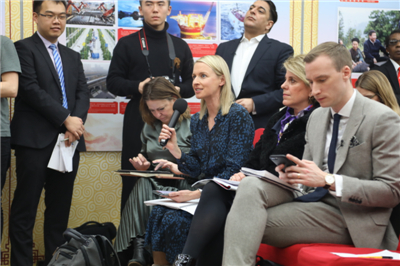
Sky News: There has been reports of an increase in hate crimes against Chinese students, Chinese citizens in the UK, including the universities, ever since the outbreak of this virus. What's your reaction to that? What do you think of that?
Ambassador: I would say, in general, the public is very supportive and sympathetic with China. As we see in the video clip, the pupils and teachers from this primary school show their solidarity with China. So I think the general public here is very supportive. We appreciate that. There are some cases of hatred and discrimination against Chinese nationals. We have raised this issue with the British government and the police. We also issued advice and warning to Chinese citizens, either living here or traveling to this country, about these incidents, so that they can be well protected. And also we give contact information. If such cases occur, they should first report to the police and get in contact with the Embassy. We will provide consular protection.
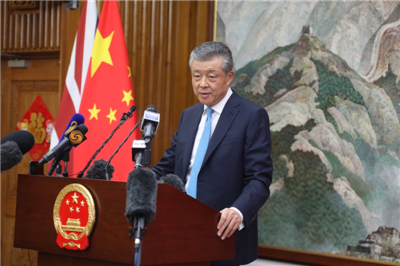
We did receive some reports from campus of universities and even in some middle schools and primary schools. I think there are many reasons for it, such as lack of understanding of the epidemic and also misinformation by some of the media. I think you should take up your responsibility to report the epidemic in a responsible and scientific way. So people would know there is nothing to worry about. Of course, there is also some deep-seated racism, not only in this country, but also anywhere. I think at the time of crisis like this, countries should stand together. People should realise that we have a common enemy of mankind. We should say no to discriminatory words and behaviour. That's why I am calling for the public, the media and people from all walks of life to stand together, to pull together, in face of the same challenges.
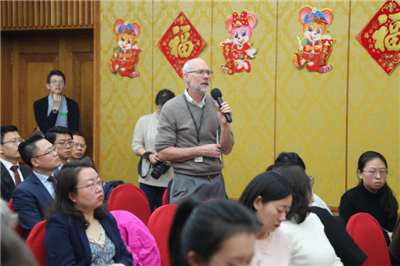
Bloomberg: Several minutes ago, you made comparison between this Coronavirus and MERS, SARS and the US seasonal flu. And really what you said is that this is not as serious.
Ambassador: I am talking about the death tolls.
Bloomberg: Are you trying to get across the message that this is not significant? This is still a very early stage, this outbreak. This is not a message to people in China and to people wherever that this is not as serious as these other outbreaks?
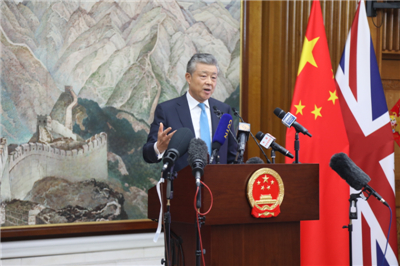
Ambassador: The message I am trying to get across is that there should not be a panic. It's a disease. It's an epidemic. We attach great importance to the seriousness of this epidemic. But we believe that we have the confidence, resources and capability to overcome this virus. Now the whole nation has been mobilized from top to the very grass-root level. I had shown you the increase of the cured cases. That gave us the reason. Just yesterday, President Xi called another meeting, in which he called the medical personnel to work around the clock, to make sure to reduce death toll, to increase cured cases. That will give people more confidence that we can win this battle. I definitely think that we have a strong leadership, we have the strength in our system to mobilise the whole country, our people are united, and also, we have the support of the international community. Of course I can't predict when the inflection point will be. We do hope it will come sooner. But I can't say when we will get there. On the one hand, we have to depend on ourselves. The scientists and researchers are working very hard. And also we engage with scientists and researchers of other countries including the UK, who has offered generous support. UK is a leader in epidemic prevention. I'm pleased that we have this foundation of cooperation. The scientists have started to work together long before the outbreak of the disease. I do hope that people would not panic about it.
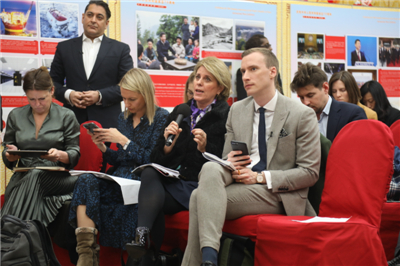
Channel 4 News: Can I just clarify something? Have you formally or informally approached the Foreign Office at any point over the past few days to ask them to review their request for British nationals to get out of China as soon as they can?
Ambassador: Yes. We did tell them overreaction is not helpful. We asked them to take the advice of the WHO to make a reasonable response. Do not overreact.
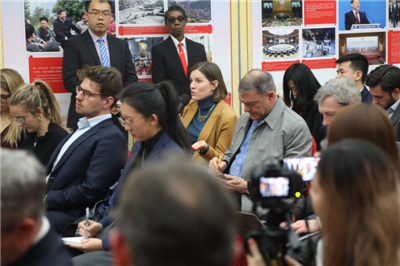
Guardian: I just want to ask about the situation in Hubei, and Wuhan in particular. It has been two weeks now of quarantine of the city. There is obviously a lot of people who aren't able to go to work, who aren't able to get money. Is this quarantine indefinite? Is the Chinese government planning measures to support people who are actually going to run out of money. And the other report we hear from Wuhan is that there are a lot people who are saying that they are not able to get testing kit. They have all the symptoms but the hospitals are so overwhelmed that they are just not able to get tested. How are you confident that you are picking up all of the cases or even the majority of the cases?
Ambassador: Definitely, the quarantine cannot be permanent, but currently is still necessary. As I said the government has gone all out to take actions. And also, you know, it's a comprehensive approach. So that's why I'm saying that the whole nation has been mobilised, not only the medical staff -- the medical staff are on the very frontline, giving treatment to the critical ill and the people who need medical care -- but also the logistics and transportation. Do you have a journalist based in Beijing? It seemed to me that he's not doing a very good job. I am not critical of your reporting. You know, the departments concerned give daily briefing these days. I follow what is going on, closely. Of course my focus is to engage with the British government to coordinate other efforts.
The Minister of Transportation, the Customs Inspector General and the Minister of Industry gave all the briefings about the supply, as I said, supply of basic needs, food and vegetables. And I think there shouldn't be a panic. With regard to this, I can't say people enjoy a normal life. But daily necessities are guaranteed. And the President and Premier both emphasised that, as I said, the safety of life and health are top priorities of the government. So this is not only referring to the people who are ill, but also to the people who are not infected, so we have to make sure that they have the daily necessities. Of course, it will take some time. The quarantine efforts have really been effective in preventing further spread of this disease. It's necessary and these measures have been spoken highly by the WHO.
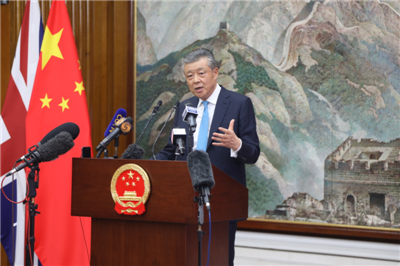
You talk about some complaints. And I think it's understandable. You know this outbreak of disease come so unexpectedly. It's a crisis, I would say. I think the central government has made very effective response. At the grass root, on the local level, I would say local level has also been mobilised, but it will take time for people to understand the nature, understand the urgency. I think, they all come to know now. I can't say China is prepared for this outbreak. We don't have enough beds, hospitals, that's for sure. So that's why we have built the two emergency hospitals within just 10 days. I don't think any other country can do this, but we tried. We tried our best to take as many patients as possible. And there are also some efforts at the grass root level. In communities, the clinics also made every effort to take care of the patients. We will do our best.
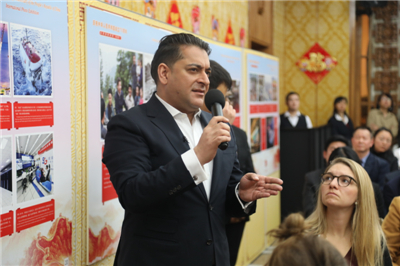
Russia Today: Ambassador, you did say there was economic damage caused by coronavirus. Is it the case that the bias in misinformation, as you alleged, on the part of media, maybe some of the journalists here, is designed to damage China economically?
Ambassador: I hope not. I've read some reports in the local media. Are they still having confidence on China's economy? You know, when your report good things, positive things, I would like to name them. But when you have bad media on China, I try to be cautious. I just gave you an example. I think Daily Telegraph carried one piece; they believe Chinese economy is still resilient. And I think FT also carried similar reports. So, I'm not saying the media in the UK talk down China's economy. I'm just giving the fact that China's economy is resilient. I hope you will also take objective, reasonable approach when reporting on China.

Financial Times: Ambassador, how many reports you've had of Chinese citizens in this country were stuck here -- people who may have come as tourists, may have come for the Lunar Festival, not able to get home because of transport difficulties, may have come for business trips -- is that a significant number? How are you helping them if it is a significant number? Are you looking after them to make sure that they have money and accommodation, etc.
Ambassador: We are trying our best to help them. Some people from Wuhan and Hubei got stranded. The government tried to get chartered flights to take them home. And we are here also trying to get in touch with the people from Wuhan and Hubei to see if they have difficulties and if they have a request to get home, but faced with the difficulties. But many of them told us they would like to stay. They still have business. They haven't finished their work here. So we are very open. We try our best to help them.
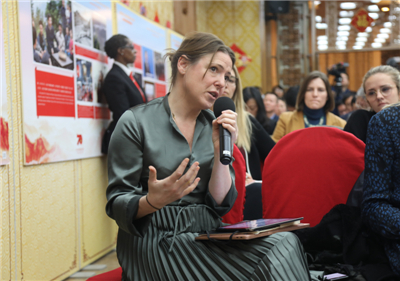
Times: There has been some warnings from the WHO ensuring that the global reaction to the crisis are driven by medical need and not political need, and I wonder if you had any sense of any countries taking more political approach? I'm thinking in particular of the context of the trade dispute with the US, and the fact that the travel advice issued by the British government came on the heels of similar advice from the US?
Ambassador: You are absolutely right. There are some people who tried to take advantage of this for political gains. We have expressed our resentment and opposition to some American politicians, when they made irresponsible remarks and tried to take advantage for their political gains. We think it's harmful to the interest of the United States, not to say damaging to the collaboration between the two countries. I am confident that the two sides will continue to work together to implement the Phase One economic and trade agreement because, as I said on several occasions, this is a good agreement. It's beneficial not only to China and the US, but also to the world. Of course, you need two to tango. So, we are committed to implementing this agreement. And I hope the other side will do the same.
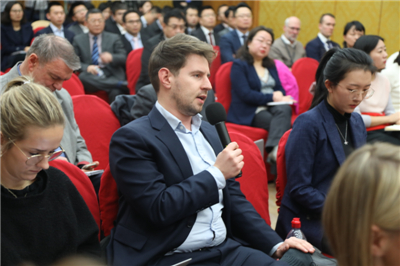
LBC: It's been reported this morning that you have some concerns about Boris Johnson's failure to engage with the Chinese government directly on this issue, so I wonder if you could say a little bit more about that. And secondly, what are you hearing about the advice that was given to British citizens living in China? As you said, that's against the WHO's advice. What's your sense of why that advice was given by the UK government?
Ambassador: You asked two questions, and I can only answer one, and then come back to you, otherwise, I can't face the pressure from James.
With regard to the Prime Minister, I think the channel of communication is good. He held Chinese New Year Reception at Number 10. Both my wife and I were invited. We had a good conversation. I conveyed the greetings from the Chinese President and Premier. As a matter of fact, when he was elected, Premier Li sent him a message of congratulations. And I took this occasion to convey greetings from the top leaders from China face to face, and he also reciprocated his greetings to Chinese leaders. And he told me he was still committed to the "Golden Era" of China-UK relations. So it's a very affirmative commitment. I think the channel of communications between our two governments is very good.
As for your second question, the second question is not that difficult to answer, I think. You'll have to ask the Foreign Office, or maybe Foreign Secretary himself, what is the reason for him to give this advice? I can't read their minds. I can only say my advice is: do not overreact.
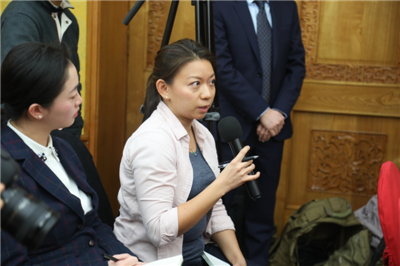
Daily Telegraph: I just want to clarify something. I was in Beijing for two days. You said that life in China is very much normal, but that was not the case. I have traveled in your cities in the last few weeks since the outbreak occurred. The cities are shut down, the ones outside of the official quarantine zone. All the transport has been closed. People are afraid to go outside. So what you said before isn't really true? And I just want to make that clear.
Ambassador: What I'm saying that you can't regard the whole country as in the same situation in Hubei and Wuhan. The whole country is different. In other countries you do not need the whole nation to be mobilised. I'm not saying everything is normal in China. I'm just saying you shouldn't overreact to what is going on in Hubei and Wuhan, as if the whole China were an epidemic zone. So do not overreact. That is what I'm saying.
Telegraph: That's what you've been saying. You say that to the rest of the world. But what are you saying to your people at home? They are overacting. They are very worried about what's going on. I've interviewed people whose family members have died within days of the onset of symptoms, who were never tested for the coronavirus and thus are not included in the official count. So how confident are you that these numbers that are coming out from the National Health Commission are indeed capturing all the cases that could be out there.

Ambassador: My advice to you is to stay with official figures. Do not believe in rumors. Do not spread rumors. Do not spread panic. I think this is the time, as I said in my presentation, the time for cool headedness. Do not be panic. Be responsible. And also my advice to you -- you are from Daily Telegraph, Right? -- It's okay that you focus on individual cases, but do not miss the big picture. When you miss the big picture, you will not know what the real situation is in China. That is my piece of advice to you. Thank you.
I think you have overdone your question time.
Telegraph: I wanted to make a comment to clarify what you were saying. I actually think that I should ask a question. I wanted to know what kind of directives the central government is giving to local governments, because a lot of provinces and cities are also implementing basically quarantine situations. Even if the city itself has not announced as such, they're shutting down the transport including roads, there are temperature checkpoints, you know, there are compounds where people can not get back in if they travels anywhere in the country for the last 14 days. So where are these actions coming from, are they coming from local government, or is the central government asking the local officials to do this?
Ambassador: I can't rule out that some local governments overreact to this. But generally speaking, the government should take up their responsibility. As I said, in all places, the key party and government officials now lead the task force to address this crisis. That is their responsibility.
And the instruction from the central government is very clear. I think the President called twice the top leadership meeting, that is the Standing Committee of the Political Bureau. It's very rare, in Chinese history to have two top leadership meetings at such a short period of time. And he called another meeting yesterday. That is a directive from the central government. I hope you will read them, word for word, sentence for sentence, that's clear. That's the instructions from central government. We asked local government to follow the central government instructions. And, of course, if the local government failed to do their duties, including officials, they will be accountable for their misconduct, that's for sure.
We just ran out of time. And since I promised you James, for your second question, you'll have the final question.
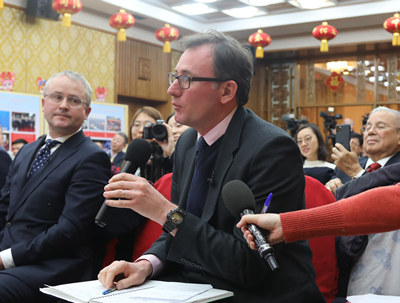
BBC: Somebody who said that this crisis has shown both the strength and weakness of the Chinese one-party state. On the one hand, the astonishing mobilisation of resources in a very short space of time -- the two emergency hospitals you referred to.
But equally, the Chinese Politburo Standing Committee has referred explicitly to the shortcomings and deficiencies of the initial response -- in other words, the lack of transparency, the blame culture, the desire to close it down rather than actually get to grips with this virus -- very, very quickly. So how do you respond to that challenge? How much does this crisis challenge the political model of the Chinese state?
Ambassador: First, I should correct you in that China is not a one party state. China is a country led by the Communist Party, but we have eight democratic parties working together with the Communist Party. So I recommend you read some basics of China's political system. And they are also very active. Many of the members of the democratic parties are top scientists and they offer their opinions. They advise the government on what to do in fighting this virus.
I am pleased you recognize the strength of the system. But we also would say that no system is perfect. I don't think you can say, in the very affirmative way, that the British system is perfect. It has taken three years to figure out Brexit. I don't want to be critical. But I think every system has a room to improve. So, that's why I always say the largest room on earth is the room for improvement.
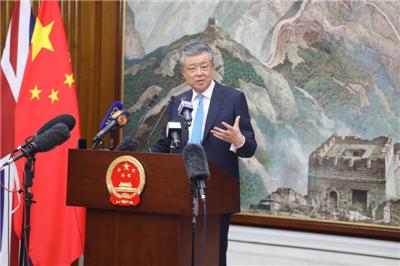
And I'm pleased that you read very carefully the press release of the top leadership meeting that we recognized there are shortcomings. There are rooms to improve so that we can do a better job in the future. And you're right. This is a challenge. Maybe we have a different understanding of the challenges. My understanding of the challenges is that it challenges us to improve our work and our system. But we are very confident in our system. As I said in my opening remarks, if it were not for this system, I would not know what kind of situation we will be facing. If you imagine a similar situation happening in the UK, I would not try to second guess what you are going to do with regard to this situation.
Thank you very much for coming to the Embassy. I look forward to seeing you in the future.
